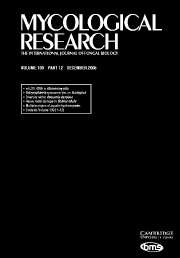Crossref Citations
This article has been cited by the following publications. This list is generated based on data provided by
Crossref.
Höller, Ulrich
Wright, Anthony D.
Matthee, Gesa F.
Konig, Gabrielle M.
Draeger, Siegfried
Aust, Hans-Jürgen
and
Schulz, Barbara
2000.
Fungi from marine sponges: diversity, biological activity and secondary metabolites.
Mycological Research,
Vol. 104,
Issue. 11,
p.
1354.
Malinowski, Dariusz P.
and
Belesky, David P.
2000.
Adaptations of Endophyte‐Infected Cool‐Season Grasses to Environmental Stresses: Mechanisms of Drought and Mineral Stress Tolerance.
Crop Science,
Vol. 40,
Issue. 4,
p.
923.
Paterson, R. R. M.
Archer, S.
Kozakiewicz, Z.
Lea, A.
Locke, T.
and
O'Grady, E.
2000.
A Gene Probe for the Patulin Metabolic Pathway with Potential for Use in Patulin and Novel Disease Control.
Biocontrol Science and Technology,
Vol. 10,
Issue. 4,
p.
509.
Redman, Regina S.
Dunigan, David D.
and
Rodriguez, Rusty J.
2001.
Fungal symbiosis from mutualism to parasitism: who controls the outcome, host or invader?.
New Phytologist,
Vol. 151,
Issue. 3,
p.
705.
PALM, MARY E.
2001.
Systematics and the Impact of Invasive Fungi on Agriculture in the United States.
BioScience,
Vol. 51,
Issue. 2,
p.
141.
Redman, Regina S.
and
Rodriguez, Rusty J.
2002.
Characterization and isolation of an extracellular serine protease from the tomato pathogen Colletotrichum coccodes, and it's role in pathogenicity.
Mycological Research,
Vol. 106,
Issue. 12,
p.
1427.
Schulz, Barbara
Boyle, Christine
Draeger, Siegfried
Römmert, Anne-Katrin
and
Krohn, Karsten
2002.
Endophytic fungi: a source of novel biologically active secondary metabolites
.
Mycological Research,
Vol. 106,
Issue. 9,
p.
996.
Vujanovic, Vladimir
and
Brisson, Jacques
2002.
A comparative study of endophytic mycobiota in leaves of Acer saccharum in eastern North America.
Mycological Progress,
Vol. 1,
Issue. 2,
p.
147.
Lopez-Llorca, L.V
Bordallo, J.J
Salinas, J
Monfort, E
and
López-Serna, M.L
2002.
Use of light and scanning electron microscopy to examine colonisation of barley rhizosphere by the nematophagous fungus Verticillium chlamydosporium.
Micron,
Vol. 33,
Issue. 1,
p.
61.
Arnold, A. Elizabeth
Mejía, Luis Carlos
Kyllo, Damond
Rojas, Enith I.
Maynard, Zuleyka
Robbins, Nancy
and
Herre, Edward Allen
2003.
Fungal endophytes limit pathogen damage in a tropical tree.
Proceedings of the National Academy of Sciences,
Vol. 100,
Issue. 26,
p.
15649.
Ooki, Yasuyoshi
Fujita, Takashi
and
Harada, Yukio
2003.
Pezicula cinnamomea from cherry tree: pathogenicity tests and photomorphogenesis in culture.
Mycoscience,
Vol. 44,
Issue. 4,
p.
319.
Mucciarelli, Marco
Scannerini, Silvano
Bertea, Cinzia
and
Maffei, Massimo
2003.
In vitroandin vivopeppermint (Mentha piperita) growth promotion by nonmycorrhizal fungal colonization.
New Phytologist,
Vol. 158,
Issue. 3,
p.
579.
Dingle, Juliet
and
Mcgee, Peter A.
2003.
Some endophytic fungi reduce the density of pustules of Puccinia recondita f. sp. tritici in wheat.
Mycological Research,
Vol. 107,
Issue. 3,
p.
310.
Braun, Karen
Romero, Jennifer
Liddell, Craig
and
Creamer, Rebecca
2003.
Production of swainsonine by fungal endophytes of locoweed.
Mycological Research,
Vol. 107,
Issue. 8,
p.
980.
Evans, Harry C.
Holmes, Keith A.
and
Thomas, Sarah E.
2003.
Endophytes and mycoparasites associated with an indigenous forest tree, Theobroma gileri, in Ecuador and a preliminary assessment of their potential as biocontrol agents of cocoa diseases.
Mycological Progress,
Vol. 2,
Issue. 2,
p.
149.
Seena, S
and
Sridhar, K R
2004.
Endophytic fungal diversity of 2 sand dune wild legumes from the southwest coast of India.
Canadian Journal of Microbiology,
Vol. 50,
Issue. 12,
p.
1015.
Ishimoto, H.
Fukushi, Y.
and
Tahara, S.
2004.
Non-pathogenic Fusarium strains protect the seedlings of Lepidium sativum from Pythium ultimum.
Soil Biology and Biochemistry,
Vol. 36,
Issue. 3,
p.
409.
Liu, Wenzhe
and
Reinscheid, Uwe M.
2004.
Camptothecin-resistant fungal endophytes of Camptotheca acuminata.
Mycological Progress,
Vol. 3,
Issue. 3,
p.
189.
Owen, Noel L.
and
Hundley, Nicholas
2004.
Endophytes — the Chemical Synthesizers inside Plants.
Science Progress,
Vol. 87,
Issue. 2,
p.
79.
Hashiba, Teruyoshi
and
Narisawa, Kazuhiko
2005.
The development and endophytic nature of the fungusHeteroconium chaetospira.
FEMS Microbiology Letters,
Vol. 252,
Issue. 2,
p.
191.




